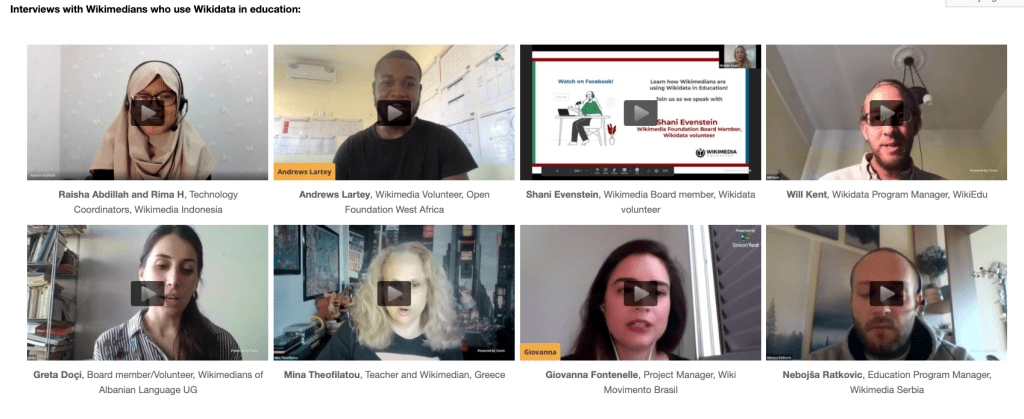
Wikimedia projects have been used in education for over two decades now. The community – meaning the people around the world who organize, lead, or participate in Wikimedia education activities – have identified ways to advocate for the use of Wikimedia projects in the education sector through new innovations and ideas.
We have heard many stories from our community and have witnessed cross-community collaborations through our community engagement efforts, and we recognize that our support didn’t reach everyone. In July 2021, we took a break from our community organizing work to identify ways to ensure our community support is more inclusive and equitable. To ensure this we have prepared a strategic document to establish the processes and mechanisms for community collaboration and support in order to grow and strengthen the EduWiki network.
Starting in October 2021, the Education Team at the Wikimedia Foundation will support the community through providing new and refreshed participation and collaboration spaces, and specialised support. This will help the community to thrive by elevating their needs, building community capacity, and fostering communal wellbeing. We will make sure that these spaces provide a platform for knowledge sharing in our movement, and that anyone who belongs to our community is welcomed.
Now, let’s talk about what we mean by participation and collaboration spaces, and specialised support. Participation and Collaboration Spaces are designed for the community to have a platform to engage, listen, and learn from each other. We aim to connect the community with other actors in the education sector and to share and highlight community work. They include:
- EduWiki Affiliate Meetings – Our monthly space for representatives of recognized Wikimedia Movement affiliate organizations to discuss their ideas and share their learnings. It aims to help affiliates to make an impact in education through collaboration, learning, and sharing. Any Wikimedia affiliate that has full-time or part-time education staff or a designated representative can be a part of these meetings.
To request an invite to the monthly EduWiki Affiliate Meeting please email education@wikimedia.org with the subject line EduWiki Affiliate Meeting and include the name of the person who will be attending, their role, and their contact information.
- EduWiki Live – A quarterly virtual meeting that is dedicated to facilitating conversations between Wikimedia Foundation Staff, Education Sector leaders and our Wikimedia community, and supporting real-time conversations about the community’s questions. It is open for everyone to participate! This event isn’t just for seasoned community members or affiliates. Anyone who has an open mind to listen, share, and learn from others can be a part of this event.
To attend the next EduWiki Live virtual event check the mailing list or the Diff Calendar for dates and times
- Regional EduWiki Meetups – Regional EduWiki meetings are planned by the community specialists of the EduWiki Outreach Collaborators and the Education team. This is an opportunity to strengthen the EduWiki network, encourage regional cooperation, explore collaboration opportunities, and identify common practices or challenges that are faced by our community in different regions of the world.
To find out when there is a regional meetup in your area check the mailing list or the Diff Calendar for dates and times
- EduWiki Week – Edu Wiki Week is a virtual celebration that aims to showcase the value of the Wikimedia projects in education, and the amazing work of our EduWiki community and allied organisations.
To participate in EduWiki Week 2021 check the Meta page and the mailing list for updates!
Specialized support:
- EduWiki Outreach Collaborators – A dynamic group of Wikimedians who collaborate with the education team at the Wikimedia Foundation to provide support, effective collaboration, and learning opportunities for the education community in the Wikimedia movement.
Applications are closed for the 2021 cohort. Consider applying in 2022!
- Consultations – We are offering a limited number of 1:1 consultations to help the community get answers to specific questions, or tap into the various expertise of the Wikimedia Foundation Education Team.
To sign up for a consultation visit the Education teams’ Calendly. You can review the expertise of our team staff and book a meeting with one of the team members. If you are not sure who can best support you, then explain what you’re looking for in the Calendly booking and we will set you up with the right person.
- Endorsements & Special Requests –
An endorsement is a formal recognition of a Wikimedia community education project or activity issued by the Education Team at the Wikimedia Foundation. The endorsement will be in the form of a letter of recognition on Wikimedia Foundation letterhead signed by the Senior Manager for Education.
To request an endorsement please complete this form at least 2 weeks in advance of the date needed.
Special requests are requests to participate in an event, lead a workshop, or co-author an academic article. Considering that our team is very small (4 people that support a global community!) we ask that any such request be given at least 1 month in advance.
Submit requests to the education team by emailing education@wikimedia.org with the subject line “Special Request” at least 1 month in advance.
Read our detailed community support strategy document on Wikimedia Commons! You can find our monthly and quarterly meetings scheduled on the Diff Calendar starting in October 2021. If you have any challenges accessing our spaces or if you have any questions, please contact us at education@wikimedia.org.

Can you help us translate this article?
In order for this article to reach as many people as possible we would like your help. Can you translate this article to get the message out?
Start translation